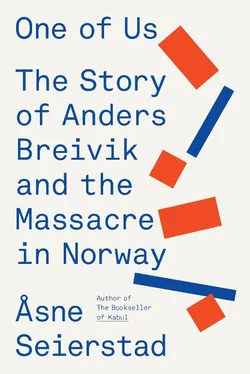Little by little, Eva started to get a feeling that something was wrong. But she dared not tell her parents that she did not want to play with Anders any more, because her mother and Wenche were by now good friends. Wenche was teaching them how to adapt to life in Norway, and she passed on clothes that no longer fitted Anders and Elisabeth.
Eva never told her parents that it was Anders who broke the heads off the neighbours’ roses, leaving just the stalks; who threw stones through open windows and ran away; or that he teased and bullied kids who were smaller than him, ideally the new arrivals who had not acquired the language to defend themselves.
One of his victims was a skinny little boy from Eritrea. On one occasion, Anders found an old rug, rolled him up in it and jumped up and down on him. ‘Don’t do that, you’re hurting him!’ cried Eva. But she stood on the sidelines, watching.
There was only one thing Anders could not abide. Being told off. Then, he would melt away while the other kids were left there to take a scolding for scrumping apples or ringing on doorbells and running away. Anders would creep out again when things had calmed down.
Once, he could not get away in time and was caught by Mrs Broch. To get his revenge after her rebuke, he peed on her doormat. He peed on her newspaper. He peed in her letterbox. Later, he went and peed in her storeroom. It was from then on that he got the blame for the stale urine smell in the basement.
One of the victims of his bullying was a girl with a mental disability. One day, Anders squashed a rotten apple into the face of the girl’s favourite doll just as her father was going by. ‘You bother my daughter one more time and I’ll hang you on the clothesline in the cellar,’ her father, a university professor, roared.
Anders took notice. A father’s threats were something he had respect for. He never went near the girl again.
* * *
He was by now seeing his own father in the school holidays. The first time, he was four and a half and his father took him for a week’s summer holiday at a cabin by the sea. Jens would occasionally ring Wenche and say he wanted to see his son. The boy sometimes ran and hid, and the other children were sent out to look for him.
Jens usually spent his summers at a country cottage in Normandy. Then Wenche would deliver Anders to the Scandinavian Airlines staff at Oslo airport, and after a two-hour flight he would be picked up by his father in Paris. Sometimes his older half-siblings would be there. They went on family outings or to the beach. At the summer cottage it was mainly Jens’s third wife who took care of the little boy. She had no children of her own and grew fond of Anders, who also became attached to her. He was overjoyed whenever she offered to read him a story. ‘Do you really want to?’ he would ask her. ‘Are you sure you’ve got time?’ He would sit curled up on her lap for hours while he was being read to. He calmed down there. And seemed to forget everything around him.
* * *
When Eva started school, Anders was in Year 3. He would not acknowledge her any longer. Not at school, that is.
The blue garden, the park and the forest were separate from school – like different continents. Their friendship only belonged in one of them.
This gave the little girl the space she needed to find her own friends. One of them was the girl who lived on the ground floor of their block of flats. She was scared of Anders too. Every time she went out of the door, she was afraid he was going to spit on her from the second floor. It had only happened once, but that was enough to make a horror of gobs of spit dog her entire childhood.
Eva finally got her own group of friends. She was now tough enough to say no to Anders when he wanted her to come out and play.
* * *
Anders was on his own again.
But one day he latched onto some classmates. It proved not to be so hard, after all. He just said hello, and they said hello back.
In his primary-school years, there was nothing very remarkable about Anders. He was there, but did not draw attention to himself. He joined the Scouts, he played football and rode round on his bike with his friends.
What marked him out from the others was that his parents were never there for him. The football team relied on parents to take turns driving the players to matches and tournaments. He always had to get a lift with others, mostly with Kristian, who lived close by. Team sports were never really Anders’s thing. He had poor ball control and often misjudged passes, but he was there.
Anders was average at most things: average height, average at school, an average sort of bully. He was far from the worst, and also capable of showing a kind of concern, like helping a bullied child who’d been hit in the face with a snowball look for his glasses. If the glasses were covered in snow he would brush them clean before handing them back.
One boy in the class was a particular target. Ahmed was nicely dressed, tall and dark – the only Pakistani in the school. He would generally sit and read in the library at break time so he would not have to face the school playground alone.
They called him Brownie.
Then one day Ahmed retaliated for the first time, and knocked Anders over. When Anders struggled to his feet, battered and bruised, everything had changed.
It was the start of a friendship.
They ran around the forest together, played basketball, went to each other’s flats to watch films. Even at primary school, the two of them were keen to earn money. Every day they waited for the newspapers to arrive. Once the copies of Aftenposten had been delivered they transferred them to their trolleys and lugged them round to the front doormats in the neighbourhood.
Anders had found a friend.
Remember when God revealed to the angels: ‘I am with you, so grant believers resolve. I shall cast terror into the hearts of the unbelievers. So strike above the necks, and strike their every finger!’ For they defied God and His Messenger, and who so defies God and His Messenger, God is severe in retribution. Here it is: so taste it! For the unbelievers the torment of the Fire!
The Qur’an, 8:12–14
It was no coincidence that Saddam Hussein chose a chapter from the Qur’an to name the assault he was planning on the Kurds. Al-Anfal means spoils of war and is a reference to God’s order to Muhammad to do battle against the infidels with all his might.
And the unbelievers shall be herded into hell , said God to Muhammad after the first great battle for Islam in Badr in 624, in order that God may distinguish the depraved from the pure. He shall heap the depraved one upon the other, piling them all up, and deliver that pile to hell. These are truly the losers.
The officers of the Iraqi army in 1988 similarly ordered their soldiers to tie the Kurds together head to toe, blindfold them and dump them from trucks into ready-dug mass graves in the desert. The victims landed on top of the still-warm bodies of dead neighbours, brothers and other relatives, and lay there waiting to be shot.
Al-Anfal is the Kurds’ holocaust – a genocide committed with the ultimate aim of Arabising Kurdistan. Arabisation had already been going on for decades. The Kurds and other minorities had been forcibly moved from border areas, while Arab tribespeople were brought in from the south under the supervision of the Iraqi army. It was important for the government to take control of the oil-rich areas around Kirkuk and Khanaqin.
The Iraqi army command calculated how to kill the maximum number of people quickly and efficiently. The villages to be cleansed were first surrounded by soldiers, then the people were forced from their houses and driven away. On reaching the place of execution they were handed over to firing squads from the elite security forces. Bulldozers covered the bodies with sand and earth, and the Kurdish problem was on the way to a solution.
Читать дальше












